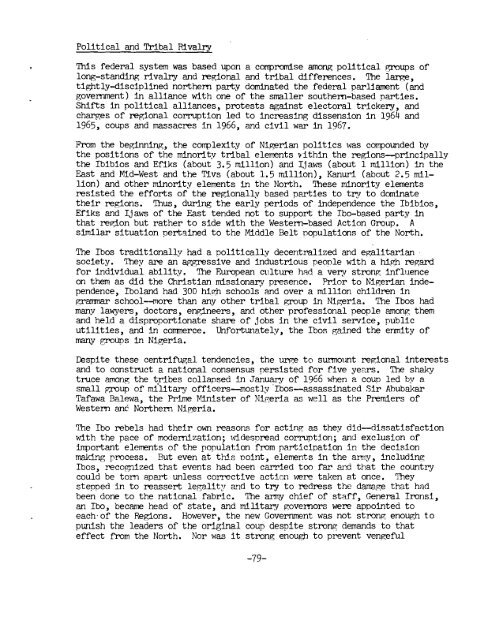3. - usaid
3. - usaid
3. - usaid
Create successful ePaper yourself
Turn your PDF publications into a flip-book with our unique Google optimized e-Paper software.
Political and Tribal Wvalry<br />
TNs federal system was based upon a compromise among political p;roups of<br />
long-standing rivalry and regional and tribal differences. The large,<br />
tight ly-disciplined northern party dominated the federal parll ament ( and<br />
govemnt) in alliance with one of the smaller southem-based parties.<br />
Shifts in political alliances, protests against electoral trickery, and<br />
charges of regional corruption led to increasing dissension in 1964 and<br />
1965, coups and massacres in 1966, and civil war in 1967.<br />
From the beginning, the complexity of Nipprian politics was compounded by<br />
the positions of the minority tribal elements vithin the regions-principally<br />
the Ibibios and Efiks (about <strong>3.</strong>5 million) and I,jaws (about 1 million) in the<br />
East and Mid-West and the Rvs (about 1.5 million), Kanuri (about 2.5 million)<br />
and other minority elements in the North. These minority elements<br />
resisted the efforts of the regionally based parties to try to dominate<br />
their regions. Thus, during the early periods of independence the Ibibios,<br />
Efiks and Ijaws of the East tended not to support the Ibo-based party in<br />
that reqion but rather to side with the Western-based Action Group. A<br />
similar situation pertained to the Middle Belt nopulations of the North.<br />
The Ibos traditionally had a politically decentralized and egalitarian<br />
society. They are an appssive and industrious people with a hi& reaard<br />
for individual ability. The European ctllture! had a very stronp; influence<br />
on them as did the Christian missionary presence. kior to Nigerian independence,<br />
Iboland had 300 hi@ schools and over a million children in<br />
granmnar school--more than any other tribal mup in Nigeria. The Ibos had<br />
many lawyers, doctors, engineers, and other professional people among them<br />
and held a disproportionate share of jobs in the civil service, public<br />
utilities, and in comnerce. Unfortunately, the Ibos gained the enmity of<br />
many grows in Nigeria.<br />
Ikspite these centrif'uqal tendencies, the urye to surmount re~ional interests<br />
and to construct a national consensus persisted for five years. The shaky<br />
truce among the tribes collapsed in January of 1906 when a coup led by a<br />
small pup of military officers--mostl.y 'Ibos-assassinated Sir Abubakar<br />
Tafawa Balewa, the Prime Mlister of Niceria as well as the Premiers of<br />
Western anc Northern Nigeria.<br />
The Ibo rebels had their own reasons for acting as they did--dissatisfaction<br />
with the pace of modernization; widesoread corruption; and exclusion of<br />
important elements of the population from participation in the decision<br />
process. But even at tMs ooint, eleme~ts in the any, Including<br />
Ibos, reco,qized that events had been carried too far mu that the country<br />
could be torn apart unless corrective actlcn were taken at once. They<br />
stepped in to reassert 1ep;alit.r ard to try to redress the dmye that had<br />
been done to the national fabric. The army chief of staff, General Ironsi,<br />
an Ibo, became head of state, and military governors were appointed to<br />
each.of the Regions. However, the new Government was not strow enough to<br />
punish the leaders of the original coup despite strollg demands to that<br />
effect from the North. Nor was it strong enough to prevent venqeful
















